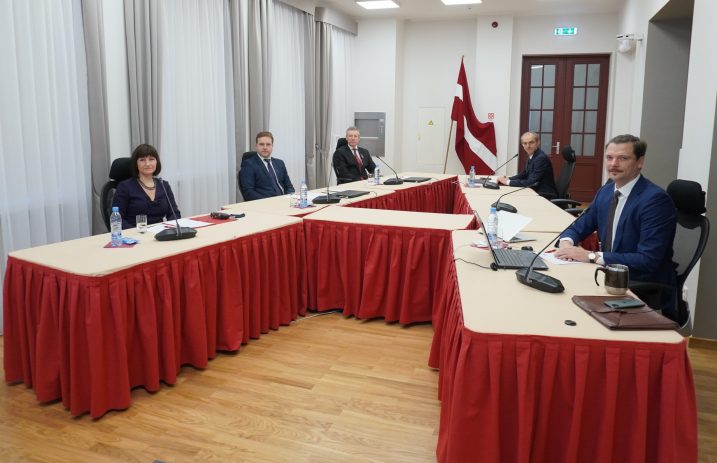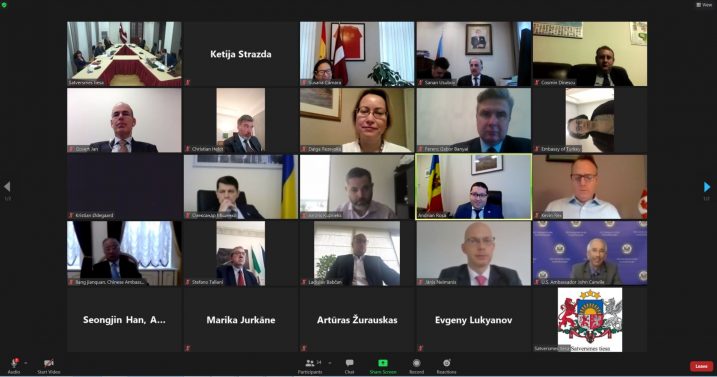Justices of the Constitutional Court strengthen the dialogue with the foreign diplomats in Latvia
On Thursday, 19 November, the Justices of the Constitutional Court met remotely with the foreign diplomatic representatives in Latvia (hereafter – the diplomatic corps). A meeting like this was held for the second time. This tradition began in May of the previous year when the representatives of the diplomatic corps visited the Constitutional Court and met with the Justices of the Constitutional Court to discuss the relevant issues of constitutional law in Latvia.
Upon opening the meeting, President of the Constitutional Court Sanita Osipova stated how satisfied she was with this possibility to convene for the remote meeting and to strengthen the dialogue between the Constitutional Court’s Justices and the diplomatic corps, which was particularly important during the spread of Covid-19.
The Court’s President shared the experience of how the Constitutional Court, in the spring, adjusted to the emergency situation declared in the state and ensured that the Court’s work continued in full scope. She underscored that the Latvian Constitutional Court was the only constitutional court in Europe, which did not postpone the hearing of cases and held remote public hearings. Sanita Osipova also highlighted the gradual digitalisation of the Court’s work, the possibility to work remotely for the Justices and the Court’s employees and also emphasised the possibility, ensured by the Court, for all interested parties to follow the public court hearings streamed in YouTube channel.

From left: President of the Constitutional Court Sanita Osipova, Vice-President of the Constitutional Court Aldis Laviņš, Judge of the Constitutional Court Gunārs Kusiņš, Judge of the Constitutional Court Artūrs Kučs and Adviser to the President of the Constitutional Court Inguss Kalniņš. Photo: Constitutional Court.
The Court’s President emphasised that the development of an active dialogue with society, the courts of national and international level as well as the constitutional bodies of the state was an essential and necessary line of the Court’s work. Close cooperation between the constitutional bodies is of particular importance in an emergency situation. Sanita Osipova mentioned as a successful example the joint meeting of the heads of the national constitutional bodies convened by the President in spring and autumn to discuss the basic operational principles of the branches of state power – the legislative, the executive and the judicial power in the conditions of an emergency situation. It was important to make the inhabitants feel safe and convinced that the situation in the state was controlled.
As regards the trends in the Court’s work, the President noted that the number of submitted applications and initiated cases had significantly increased and that the legal issues to be examined in the cases had become more complicated.
In her address, Sanita Osipova underscored: “Through our judgements, we reveal, explain and protect Latvia’s constitutional identity. In its judgements, the Court examines the compliance of the contested legal norms with the Satversme and also reveals the content and values of the general legal norms. The Constitutional Court has a clear and definite methodology for reviewing the constitutionality of legal norms. This methodology is binding also upon the legislator. In this way, the Court ensures stability and predictability. This approach is characteristic of countries with old democratic traditions.”
The Court’s President also highlighted the results of the public opinion survey, conducted in July of this year, when for the first time the view and knowledge of the Latvia’s inhabitants with respect to the Constitutional Court and various aspects of its work were identified. The research revealed that half of Latvia’s population trusted the Constitutional Court; however, the knowledge about the Court’s jurisdiction, the basic law of the State and the mechanism for protecting fundamental rights was insufficient. This means that active communication aimed at public awareness raising should be continued.
During the second part of the meeting, Justice of the Constitutional Court Artūrs Kučs informed the representatives of the diplomatic corps about high profile cases linked to the relationships between the majority and the minority in a democratic state governed by the rule of law. He acknowledged that this year the Court encountered situations, in which the minority rights had to be examined in various contexts and meanings. Providing insight into this, he highlighted the following cases: regarding the suspension from the performance of the duties of office of a member of the Saeima with respect to whom criminal prosecution had been commenced (No. 2019-08-01); regarding the minimum guaranteed income (No. 2019-24-03); regarding the language of instruction in institutions of pre-school education (No. 2019-20-03), and the right of the partner of the child’s biological mother to a leave following the birth of the child (No. 2019-33-01).
“Quite often, the cases reviewed by the Constitutional Court pertain to topics that are sensitive in our society and comprise contradictory opinions. However, in a democratic state governed by the rule of law it is the task of the constitutional court to hear these cases and to deliver rulings that are not based on the views of the majority or the minority but are based on the general legal principles,” Artūrs Kučs emphasised.
Diplomats from 24 countries as well as a representative from the Representation of the European Commission in Latvia participated in the event.

Screenshot from the remote meeting of judges of the Constitutional Court and representatives of the diplomatic corps.
The presentation of the Constitutional Court’s President Sanita Osipova in English is available here.
The presentation by Justice of the Constitutional Court Artūrs Kučs in English is available here.
The report on the Constitutional Court’s work in 2019 in English is available here.



